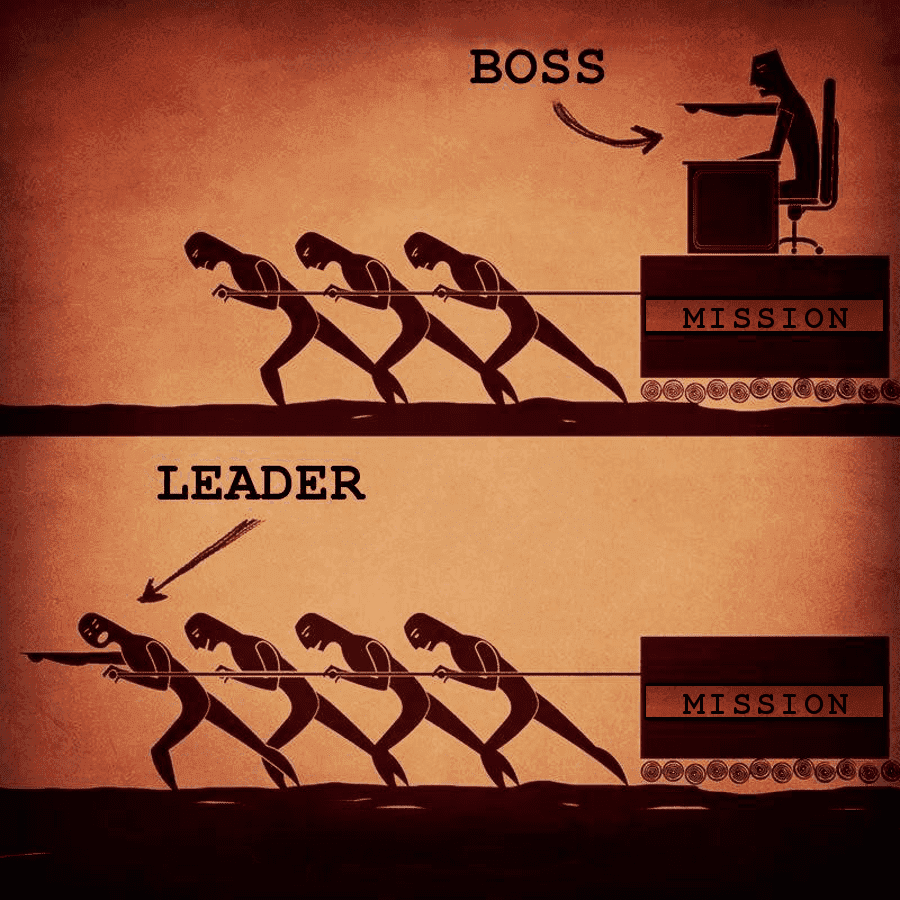If there's one thing I've come to appreciate, it's the absurd odds stacked against entrepreneurs succeeding; there's just so much that you have no idea about and need to quickly learn.
For everything you must get right to succeed, there are a dozen things that could undermine you and lead you to still fail.
You could spend years learning just one skill to help you succeed like SEO, analytics, customer development, copy-writing, UX design, fundraising, product development, development architecture, or simply great coding.
Unfortunately, the demands of startups says you need to become competent and relatively adept at all of those and more.
Among all those hard skills to develop, I didn't even mention leadership, which I think is the most underrated skill to develop as an entrepreneur.

Leadership: the Overlooked, Essential Skill for Entrepreneurs
Leadership is a bit different, because it's a soft skill; it's not as easy to measure as the success of your marketing campaign or the elegance and functionality of your code.
However, it's an immensely important skill for entrepreneurs and one with more long term value than becoming an expert in any one of the aforementioned hard skill areas.
Without it, all the hard skills in the world won't matter.
If your goal is to build a company with more than yourself as an employee, then you're going to be leading others. As you grow, you'll be leading more people and spending less time on any of the individual skills you used in the early days.
Instead, you will spend a lot more time on communication, vision, goal setting and coordination across teams. This is what determines whether you build a good company or a bad one.
As I've learned through my own errors and in talking to other entrepreneurs, I've noticed there are 3 major concepts most of us don't recognize that are absolutely critical to leading your company as an entrepreneur whether you have a few employees or a few thousand:
- Your employees don't work for you; You serve them
- Uncover and fix problems when they're small
- What works at one size of team fails with another

1) Your employees don't work for you; You serve them.
Having employees means that you've been able to convince others to work with you on your idea. Appreciate the incredible feat that it is.
However, do not think that because they work for you that they are now enlisted to your dictatorship. "Being the boss" is a great way to lose your team, and potentially your company.

You need to involve them in core discussions, listen to their ideas and feedback, and cultivate a culture of appreciation.
A happy, engaged employee is significantly more productive than a frustrated, stymied, or sad employee. This ebbs and flows, so you really need to watch for it on a daily basis, especially if your company is growing or changing rapidly.

Praise is your secret weapon.
Showing appreciation for those that work for with you is not optional; you cannot over-recognize their best efforts.
At the same time, it is a balancing act. Each employee will respond differently, so it's a skill that requires fine tuning for everyone you work with. Some people want to be publicly recognized. Others feel physically uncomfortable to be praised in front of others.
Unfortunately, what I, you, or anyone else prefer is completely different than the next person you hire, so taking the time to understand how people prefer to be recognized is a worthwhile investment; an hour spent developing and appreciating your employees will pay you back exponentially.
Further Reading:
Learn the most effective ways to give praise here:
- 5 ways to give effective praise to motivate your team
- The Ultimate Guide to Praise & Positivity
- 3 keys to remember when giving praise that your team will appreciate most

2) Uncover and fix problems when they're small.
With all the hustle and constant activity buzzing around a growing company, it's easy to overlook small problems. Don't.
When problems are small, solutions are small as well. When problems grow up, then it takes big, dramatic solutions to overcome them. If it's an interpersonal issue or a major team issue, then suddenly that small issue can lead to someone having to be let go, or teams feeling deeply divided.
Catch problems when they're small by reading your employees; look at their face and posture, and if an employee seems down or upset…asking them if something is up and seeing if you can help has huge immediate and long term benefits.
Use your 1 on 1s as a way to privately discuss the issues on their minds and work to improve them. A small investment now can save you fire fighting later and falling into reactive management.

Experience the upside of prevention
Conflicts and small issues are often simple misunderstandings or honest mistakes. Tackling them head on breeds a culture of accountability and openness to healthy feedback.
When you get your team in this habit, it becomes much easier to avoid major problems, because they never get that big.
Having a discussion about firing someone is a much more dramatic discussion (and a lot more expensive!) than talking to an employee about a minor issue that may have caused conflict or hurt the company. And if you've had a series of conversations about a problem that hasn't changed, it's much less surprising to let someone go than to wait and then let them go with limited warning.
A note on mega-hyper-growth companies
If you're building a rocket ship of a startup and have a one-in-a-billion unicorn that is dominating the market so well nothing seems to stop growth, you might be able to ignore this lesson.
I've known quite a few Silicon Valley darlings that have had horrendous problems with sexual harassment (Uber), law-breaking (Zenefits), and other scandals. The faster you're growing, the more you can get away with these kinds of issues.
As the saying goes, "winning solves a lot of problems."
Unfortunately, I've also known dozens more companies that seemed like rockets, but then they started having 35%+ annual turnover and soon their growth flattened, the VC money well dried up, and the dream was over for those entrepreneurs.
So for those of you building companies with more typical growth, or who don't want to take their chances that they succeed in spite of being a bad place to work, consider how you can stay on top of the most important problems in your company.
If you hire good people, and treat them well, not only will they help you identify these problems, but they'll also lead the charge in fixing many of them.
Further Reading:
If you need to be better about listening to your team and fixing problems, start with these posts:
- What to do if your team stops coming to you with feedback
- How to deal with low performing employees
- Learn how to fix your company if you're already at a point of your team being miserable or possibly hating you.

3) What works at one size of team fails with another.
One of the biggest challenges for entrepreneurs is that the rules are always changing.
At first, all that matters is seeing if you and your partners or co-founders are working on something that matters. Then you may be fighting for profitability, fundraising, or trying to scale up.
All of a sudden, you'll have fewer and fewer individual contributor responsibilities. Then you'll have only managers reporting to you, and then leaders of leaders, and then...you get the point.
As your company grows, you'll run into issues where what was working great doesn't work any more. In many ways, it's a numbers game:

Every person you add to your team increases the lines of communication geometrically. This is why a tight-knit, high performing team that all fit around 1 table can really struggle when you go from 10 to 20 or 30 employees.
As a leader, and a company, you have to evolve.
You have to embrace reinvention and changing how you do things to work at the size you are, not the size you were. This is why Sequoia Capital has written about "the Rule of 3 and 10," and one of our most popular posts is called, "Why everything breaks at 25 employees."

Develop leaders, or hire someone who is passionate about doing so
The best way to survive and thrive in the chaos of growing your company is to surround yourself with great leaders. When you empower them, they can help solve problems as they come up, and prevent everything building up and ending up on your plate or never fixed.
Yet, this doesn't happen by accident. In fact, the only companies I've ever seen thrive long term, put up great numbers consistently, and avoid a cascade of scandals, are the ones that are extremely intentional about their culture and leadership.
Now, not everyone is passionate about leadership. You may be an engineer or sales person at heart, and that's the best thing you can do for your company.
When that's the case, you need to find someone else who does deeply care about leadership and culture. Then, back them 100%, and give them everything they need to build a healthy culture at your company.
This generally works best when it's one of your partners or cofounders, as employees tend to emulate and look to these people (and you) most.
No matter how you do it, remember your example and actions are the #1 most important form of leadership. Nothing will undermine you (or the person you hire) quite like saying one thing and then doing another.

Promoting from within is a secret weapon of great entrepreneurs
If you get this right early, a lot of things get easier; a small company with a healthy culture is much easier to scale up to a big company with a healthy culture than trying to fix a bad culture as you grow.
And one of the best ways to preserve your culture is to promote from within.
Promoting from within sends strong signals to all of your employees:
- There's a growth path and opportunities to advance for employees
- Each promotion shows what actions and results you reward
- Future employees see that your company really is a place worth sticking around for awhile (and many of your early employees are more likely to then stick around)
Equally important, promoted employees typically have a larger impact on hiring; they build your teams and departments.
If you get great leaders early, and help develop some of your early hires to lead, too, you build the foundation of a great culture. Over time, their knowledge, oversight, and deep involvement in building your company, makes all these challenges easier.
While sometimes, hiring in leaders will be the right decision either due to skills needed, or a lack of interest from your team, mixing in some promoting from within is an important part of thriving under the constant change you'll find as you grow.
Further Reading:
If you need to better manage the challenges of scaling up your company, consider these posts to help you:
- Learn how to develop leaders when your team grows too big
- Find out why Silicon Valley has so many bad managers (and how you can avoid the vicious cycle)
- Read our interview with AbstractOps about this and other management challenges here
- Learn the 5 ways founders can wreck their culture (and how to fix it)
—
Just like hard skills require practice and active use to become sharper, leadership skills like the concepts above require practice and reflection to become great at them.
While starting off on the right foot is always best, no matter where you and your company are, now is always the best time to make a change to get better.
Your team will thank you, and you very well could be changing the fate of your company by doing so.





